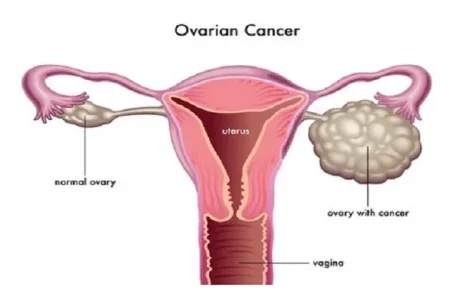P
PressRoom
Guest
Ovarian cancer is a type of cancer that begins in the ovaries. Ovarian cancer often goes undetected until it has spread within the pelvis and abdomen. At this late stage, ovarian cancer is more difficult to treat and is frequently fatal. For the purpose of this article, here is a look at the signs and symptoms of ovarian cancer.
---
READ: Ovarian Cancer: 7 Important Risk Factors You Should Never Ignore
---
Don't be scared. These symptoms are common for some women. They may not mean that you have ovarian cancer. But the early symptoms of ovarian cancer follow a pattern:
Also Know That:
Awareness of how your body normally feels and paying attention to symptoms that persist for several weeks can help guide your decision to see a doctor. Many signs of ovarian cancer, such as abdominal bloating, may suggest a gastrointestinal issue. Talk with your doctor about ovarian cancer being part of the problem.
Be aware — but don’t make yourself sick with worry
PS: This information put together as a guide are culled from health-related articles on websites, journals, and videos.
---
- Difficulty eating and feeling full quickly
- Unexplained weight loss
- Discomfort in the pelvis area
- Changes in bowel habits, such as constipation
- A frequent need to urinate
- Abdominal bloating or swelling
- Back pain
- fatigue or low energy
- Pain during sex
- Menstrual irregularities
READ: Ovarian Cancer: 7 Important Risk Factors You Should Never Ignore
---
Don't be scared. These symptoms are common for some women. They may not mean that you have ovarian cancer. But the early symptoms of ovarian cancer follow a pattern:
- They start suddenly.
- They feel different than your normal digestive or menstrual problems.
- They happen almost every day and don't go away.
Also Know That:
Awareness of how your body normally feels and paying attention to symptoms that persist for several weeks can help guide your decision to see a doctor. Many signs of ovarian cancer, such as abdominal bloating, may suggest a gastrointestinal issue. Talk with your doctor about ovarian cancer being part of the problem.
Be aware — but don’t make yourself sick with worry
- It is important to remember that most women with these symptoms will not have ovarian cancer. Your doctor should first rule out more common causes of these symptoms, but if there is no clear reason for your symptoms, your doctor needs to consider the possibility of ovarian cancer.
- If you are not comfortable with your doctor’s diagnosis or you are still concerned about unexplained persistent symptoms, you should seek a second opinion.
- You know your body better than anyone else, so always listen to what your body is saying and trust your instincts.
PS: This information put together as a guide are culled from health-related articles on websites, journals, and videos.


